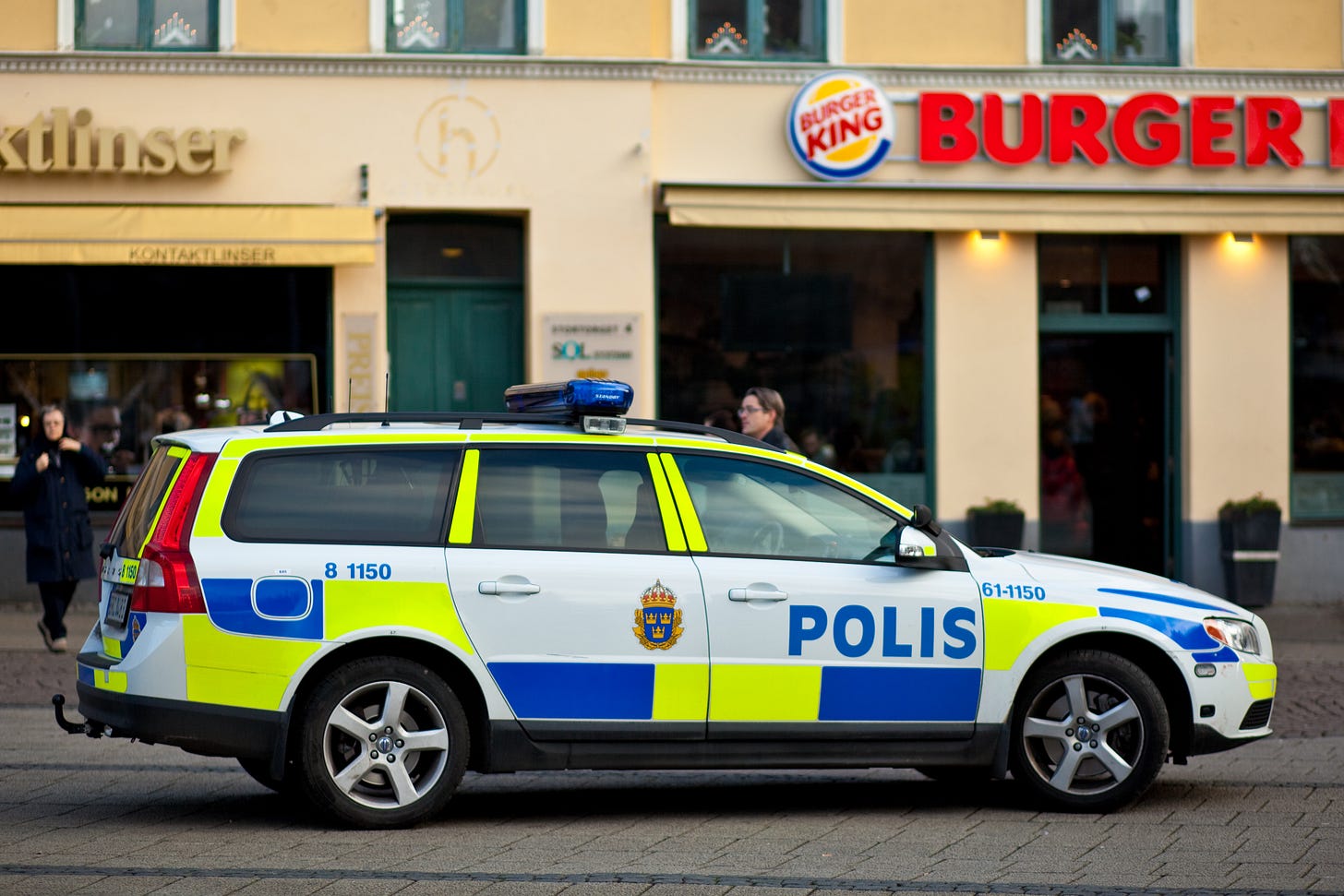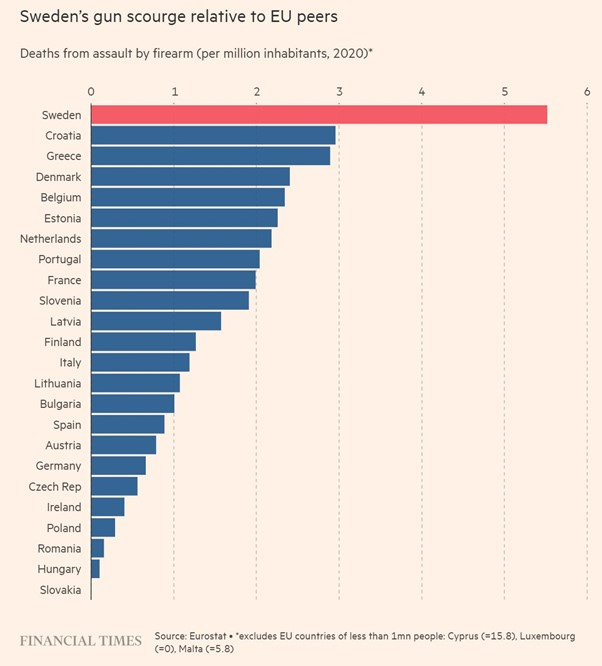What happened to Sweden?
Mass immigration has caused deep social convulsions in this model of social democracy - yet many on the Left refuse to acknowledge it
Honesty in political debate is vital. Sometimes the facts and evidence will lead you to draw conclusions that conflict with your own hitherto settled opinions or those of your particular tribe. What you do at such moments – whether you choose to continue peddling the ‘accepted line’ or revise your argument on the basis of what you have learned – will say a lot about you.
Having spent most of my adult life as an activist on the political Left, I get into all sorts of trouble whenever I express reservations about the phenomenon of mass and uncontrolled immigration. I have for many years argued – contrary to today’s Left orthodoxy – that rapid and large-scale movements of labour have the same ability to cause social and economic disruption in working-class communities as those of capital; that a complete failure on integration has led to the ghettoisation of some of our towns and cities and undermined social solidarity within them; that a policy of free movement across highly-diverse economies can, for the parent countries, lead to depopulation crises and the draining of vital human resources; and that the labour supply is ultimately a market dynamic which, as with all market dynamics, needs to be strictly regulated, the better to enable governments to plan around such things as housing, employment, welfare, and to protect wages against downward pressure.
There was a time when such opinions were tolerated – some might even say mainstream – on the Left. Nowadays, anyone on the Left voicing such opinions is likely to be condemned as some kind of rabid nativist. Conversely, support for open borders – once the preserve of Trotskyists, anarchists and hyper-liberals – now passes for conventional wisdom.
For many on the Left, the entire issue of immigration has become a touchstone by which the forces of good and evil may be determined. Support free movement, and you’re a ‘kind’ person. Anything less, and you’ll quickly find yourself demonised. The demonstrable negative effects of too much immigration on working-class communities – on wages, housing, public services and social cohesion – are ignored. The facts and evidence can go whistle. In their place is to be found trite sloganising and name calling.
This disdain for inconvenient truths and real-world experience is blazingly apparent in the debate – or lack of it – over Sweden. Once the poster boy for much of the Left – a model, it was said, of a modern, progressive, social democratic society; a nation at ease with itself and with high levels of social solidarity – Sweden is going through huge social convulsions, the consequence of a wave of immigration that began to affect the country from around 2015. In 2016 alone, a record 160,000 immigrants arrived in Sweden – by anyone’s reckoning a significant number in a country with a population of less than 10million. Today, over a fifth of the population in this one-time ethnically and culturally homogeneous country is foreign-born.
A piece in the Financial Times earlier this week illustrated the degree to which national life in Sweden is changing. As the numbers of new arrivals – from countries such as Syria, Iraq and Afghanistan – have surged, so the country has experienced an unprecedented bout of serious violence, and in particular gang warfare over control of the drugs trade. ‘At its worst in September and October,’ according to the piece, ‘barely a day went by without a shooting, bombing or hand grenade attack — sometimes several. The Nordic country has gone from having one of the lowest levels of fatal shootings in Europe to one of the highest in just a decade. Well-established criminal gangs, largely run by second-generation immigrants, are no longer just killing each other but increasingly relatives and … innocent bystanders.’
In September, the prime minister, Ulf Kristersson, made a televised broadcast to the nation in which he admitted that ‘irresponsible immigration policy and failed integration’ was to blame for the violence. ‘Sweden has never seen anything like it before,’ he said. ‘No other country in Europe is seeing anything like it.’
The situation recently became so dire that the government was forced to draft in the army to help the police.
The ongoing turmoil has provided a massive electoral boost to the nationalist Sweden Democrats, an anti-mass-immigration party which once stood on the fringe but now wields significant influence in the nation’s affairs. The party isn’t, by any stretch, everyone’s cup of tea, but there can be little doubt that it has shifted the axis of debate on questions of immigration and integration and, in doing so, reflected deep public concern.
For it is beyond question that the sheer scale and pace of immigration into Sweden is changing the character and culture of that country in a way that has left many of its citizens uneasy and fearful. That anxiety is born not from some sort of irrational prejudice but from facts and evidence (and, in some cases, personal experience).
In the face of these seismic developments, have those on the British Left who in the past were so quick to express their admiration for Swedish society updated their views at all? Has there been any pulling back from their enthusiasm for liberal immigration policies? Has the Swedish experience taught them anything? Not that anyone would notice. So far as I can see, there is almost complete radio silence on the subject.
Immigration can, in moderation, be a good thing, of course. Unquestionably it has brought benefits to British society, just as it has to Swedish society. But lose control of it, and the native population – most of whom will be perfectly decent and tolerant citizens – will make their views felt at the ballot box. They accept that demographic change will happen. But they want that change to occur at a scale and pace that is manageable. And they understand, too, that the greater the numbers, the less inventive there is to integrate – the two things go hand in hand. To that extent, it is a numbers game, and we should be bold about saying so.
In the end, you cannot foist swift and far-reaching social and cultural transformation on communities without experiencing blowback, and no amount of telling voters that ‘Refugees are not to blame’ (which, in any case, most of them readily accept) or that we must instead aim our fire exclusively at ‘the bosses’ or ‘the rich’ is likely to alter their minds. These truisms were evident with the Brexit vote in 2016. And I suspect they will become evident again at the next UK general election, not least as a consequence of the quite breath-taking net migration figures announced by the Office for National Statistics yesterday.
This is a lesson being learned (or not, as the case may be) by the Left elsewhere throughout Europe, including in countries such as the Netherlands, Germany, France, Austria, Finland and Italy, where nationalist and populist parties have made considerable strides as a result of voter concerns over rapid and profound demographic change.
It didn’t have to be this way. A Left that was in tune with the wishes of most voters on the topic of immigration and integration, and recognised that there was nothing uncivilised – or indeed un-socialist – about controlling the labour supply, would not have ceded the electoral ground that it has across the continent. On the contrary, as the Centre-Left Social Democrats have shown in Denmark, a robust stance on these issues can help deliver electoral success and is entirely consistent with a desire to defend the interests of workers. As the leader of that party, Mette Frederiksen, observed in 2019, ‘For me, it is becoming increasingly clear that the price of unregulated globalisation, mass immigration and the free movement of labour is paid for by the lower classes.’
I won’t hold my breath for any sort of epiphany among the bulk of the commentariat and foot soldiers of the British Left, mind. More likely they will, in the face of all the facts and evidence from Sweden and elsewhere, persist in rejecting any suggestion that they have got it wrong on this issue and seek to ostracise those among their number who argue to the contrary. In observing their stubbornness, it would be quite easy to believe they had adopted the dictum of the bumptious first world war officer General Melchett of Blackadder fame: 'If nothing else works, a total pig-headed unwillingness to look facts in the face will see us through.’
Talking of refusing to look facts in the face, hats off to the women footballers in Sheffield who boycotted league matches in protest at the decision of one club to field a transgender player who had caused a serious injury to an opponent. More of this bravery, please.
I appeared as a panellist on GB News’s Dewbs & Co. last Friday. The full episode can be viewed here.
A reminder that you can follow me on X (formerly known as Twitter): @PaulEmbery




I love how the media seem to feign to surprise about he election of Geert Wilders in Holland and the riots overnight in Dublin. Sweden has shown us the movie , we do not need sequels in our country .
To me the problem is that we in the West, whether we like it or not , need immigration (and lots of it) to sustain our nation and particularly welfare arrangements. The hidden issue is that the indigenous population (the descendants of immigrants who arrived here in the unrecorded past in the Bronze Age in most cases) are not having enough children, and without it our population will age and more and more elderly people would be relying on less and less workers paying their dues.
It’s a matter of record that governments of all hues reduced the support for families to nothing over the decades. Life has become so expensive that a married couple NEED to work to afford a massive mortgage. I personally think the Thatcher era of the 80s institutionalised greed into our society, getting rid of council homes for a song and getting the population indebted, but also Gordon Brown as chancellor stated that it was ‘no part of government to prescribe one form of family over another’ and killed the married couple’s tax allowance. Thus families and kids are disincentivised (is that a word?😂)
The only answer to mass immigration, which is naturally going to come from the poorest and most marginalised areas of the world, is for governments to see the value of stable families as a bedrock of society and start to support that. It may already be too late.
I appreciate that I have only written a little bit here - there is much I could write… but it’s not my blog! Suffice to say that I accept many single parents and non standard families can (and do) do a great job but for the best average outcome in life and start for kids, families are necessary.
That would eventually reduce our reliance on immigrant workforce members, I believe.